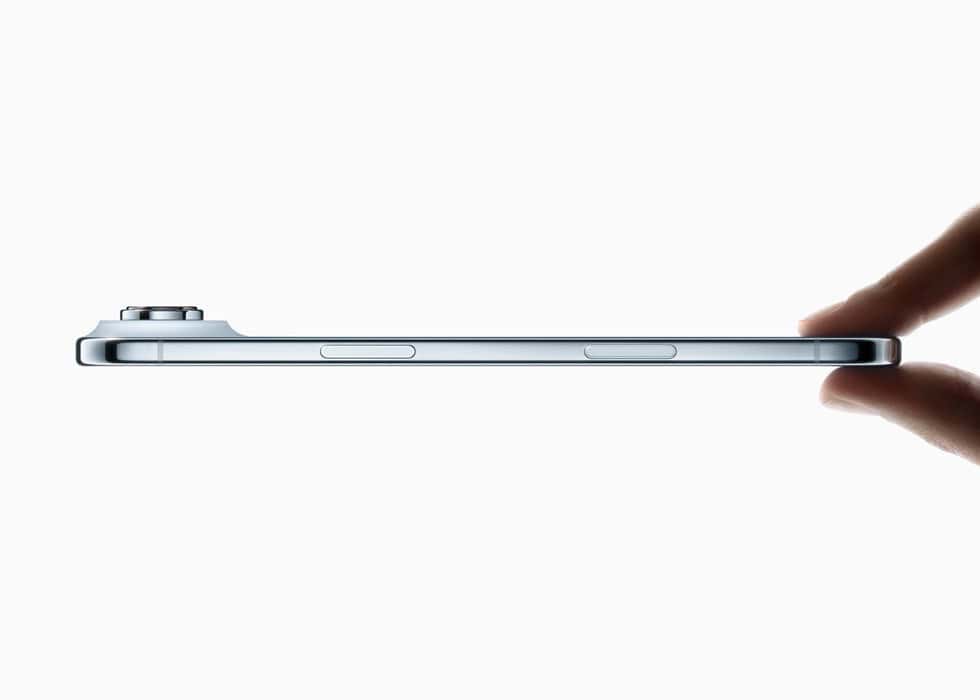
iPhone Air Everything about the new, thinnest iPhone ever
-
Administrator
-
10/09/2025
Apple once again made a difference in the smartphone world with the launch of the iPhone Air, officially unveiled at the Awe Dropping event in September 2025. An ultra-thin device had been talked about for years, but few believed that the Cupertino brand would once again risk a design that prioritizes lightness without compromising durability and performance.
We operate on all continents. See where we are and how we are growing as a global provider of IT solutions.
- Cândido da Silva
The result is a device that not only surpasses the legendary iPhone 6 in thickness, but also redefines how we think about the balance between portability, power, and durability. The Thinnest iPhone Ever At just 5.6 mm thick at its thinnest point, the iPhone Air is officially the thinnest iPhone ever produced. For perspective, the iPhone 16 Pro was 8.25 mm, while the iPhone 6, until now considered the slimmest, measured 6.9 mm. This difference places the new model at a level that seemed unattainable, especially considering the current demands of batteries, high-performance cameras, and increasingly complex processors. Despite its extreme thinness, Apple claims this is also the most robust iPhone ever. The secret lies in the use of recycled titanium for the frame and the new-generation Ceramic Shield, which, according to the brand, guarantees three times greater scratch resistance compared to previous generations. Larger, Brighter Display The iPhone Air features a 6.5-inch display, slightly larger than the base iPhone 17, with Super Retina XDR technology. Apple has integrated ProMotion with an adaptive refresh rate of up to 120Hz, offering smoother browsing and gaming. For those who spend a lot of time outdoors, maximum brightness reaches an impressive 3,000 nits, ensuring exceptional visibility even in direct sunlight. Contrast has also been improved, offering clearer reading and sharper images in any scenario. And of course, the always-on display is part of the package, with a refresh rate that can drop to as low as 1Hz to save battery life. A19 Pro: Cutting-Edge Performance with Energy Efficiency At the heart of the iPhone Air is the A19 Pro chip, Apple's latest processor, built on 3nm architecture. It features six CPU cores and a GPU optimized for gaming and demanding graphics tasks. The iPhone Air also includes the C1X modem, which works in conjunction with the new N1 network chip. This duo promises Wi-Fi 7, Bluetooth 6, and Thread connectivity, while ensuring greater energy efficiency. Apple claims the modem consumes 30% less power than the one found in the iPhone 16 Pro. Another important detail is the absence of a physical SIM card slot – the iPhone Air is fully compatible only with eSIM, in line with Apple's overall strategy of internal simplification and space optimization. Camera: Refined Simplicity Unlike the iPhone 17, which features a dual-rear camera system, the iPhone Air maintains only a single main lens, but of superior quality. 48 MP sensor, f/1.6 aperture, with built-in 2x optical zoom. Capable of recording in 4K at 60 fps with Dolby Vision. On the front, there's the new Center Stage camera, now with an 18MP square sensor, allowing for portrait or landscape selfies without the need to rotate the device. Artificial intelligence automatically detects the ideal framing, especially for group photos. Battery: Enough for a Full Day? The reduced thickness inevitably raises questions about the battery. Apple guarantees "all-day" battery life, but doesn't provide specific metrics. A direct comparison with the iPhone 17, which offers up to 30 hours of video playback, suggests the Air could fall slightly short in this regard. To compensate, the brand is simultaneously launching a new MagSafe battery pack, which extends battery life and is sold separately. Minimalist Design in Four Elegant Colors Thin, robust, and elegant: the iPhone Air arrives in four color options that reinforce the line's sophistication: Space Black Cloud White Light Gold Sky Blue With these colors, Apple continues its tradition of offering both understated options and more modern variations. Pricing and Versions The iPhone Air is positioned as a premium model, with prices tailored to its design statement status: Portugal iPhone Air (256 GB): €1,249 iPhone Air (512 GB): €1,499 iPhone Air (1 TB): €1,749 Brazil iPhone Air (256 GB): R$10,499 iPhone Air (512 GB): R$11,999 iPhone Air (1 TB): R$13,499 Mozambique iPhone Air (256 GB): 130,000.00 Mt iPhone Air (512 GB): 160,000.00 Mt iPhone Air (1 TB): 185,000.00 Mt South Africa iPhone Air (256 GB): R35,000 iPhone Air (512 GB): R41,000 iPhone Air (1 TB): R45,000 Pre-orders begin on September 12, 2025, with an official launch on September 19 in over 60 countries, including Portugal and Brazil. iPhone Air: Innovation or Just Aesthetics? The iPhone Air opens a new chapter in Apple's strategy. It is both a niche product and an impressive engineering exercise, aimed at those who value ultra-thin design and lightness without sacrificing performance. For users who prioritize long battery life or photographic versatility, the iPhone 17 or iPhone 17 Pro remain more balanced alternatives. But for those looking for the lightest iPhone And, thinner and with a greater sense of elegance, the Air is an irresistible proposition. Apple not only revives the memory of the iconic iPhone 6, but also proves that it's still capable of surprising a market saturated with repetitive designs.
Free Shipping
Free Over R10.000
24 x 7 Service
Online Service For 24 x 7
Online Pay
Online Payment Avaible
Festival Offer
Super Sale Upto 20% off
100% Original
100% Money Back



Publisher by Administrator